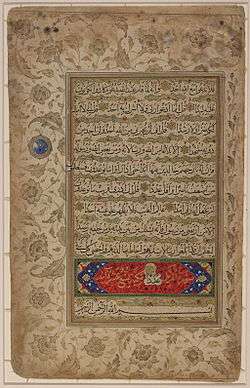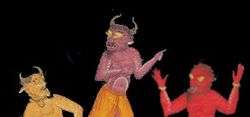Exorcism in Islam

Exorcism in Islam is called ruqya. It is used to repair the damage caused by sihr or witchcraft. Exorcisms today are part of a wider body of contemporary Islamic alternative medicine called al-Tibb al-Nabawi (Medicine of the Prophet).[1]
Islamic religious context
Muslims believe in the concept of a malevolent Devil. Belief in Jinns, or supernatural beings, is also widespread in the Islamic world.[2][3]:68[4]:193:341
A related belief is that every person is assigned one's own special jinnī, also called a qarīn (also called a hamzaad in Iran, India & Pakistan), of the jinn that whisper to people's souls and tell them to submit to evil desires.[5][6][7] The notion of a qarīn is not universally accepted amongst all Muslims, but it is generally accepted that Šayṭān whispers in human minds, and he is assigned to each human being.[8]
Procedure
Islamic exorcisms consist of the treated person lying down, while a white-gloved therapist places a hand on a patient’s head while chanting verses from the Quran.[1] The drinking of holy water may also take place.[9]
Specific verses from the Quran are recited, which glorify God (e.g. The Throne Verse (Arabic: آية الكرسي Ayatul Kursi), and invoke God's help. In some cases, the adhan/"ah-zan" (the call for daily prayers) is also read, as this has the effect of repelling non-angelic unseen beings or the jinn.
The Islamic prophet Muhammad taught his followers to read the last three suras from the Quran, Surat al-Ikhlas (The Fidelity), Surat al-Falaq (The Dawn) and Surat al-Nas (Mankind).
(e.g. The Throne Verse (Arabic: آية الكرسي Ayatul Kursi) :-
| Arabic | Translation |
|---|---|
|
اللّهُ لاَ إِلَـهَ إِلاَّ هُوَ الْحَيُّ الْقَيُّومُ لاَ تَأْخُذُهُ سِنَةٌ وَلاَ نَوْمٌ لَّهُ مَا فِي السَّمَاوَاتِ وَمَا فِي الأَرْضِ مَن ذَا الَّذِي يَشْفَعُ عِنْدَهُ إِلاَّ بِإِذْنِهِ يَعْلَمُ مَا بَيْنَ أَيْدِيهِمْ وَمَا خَلْفَهُمْ وَلاَ يُحِيطُونَ بِشَيْءٍ مِّنْ عِلْمِهِ إِلاَّ بِمَا شَاء وَسِعَ كُرْسِيُّهُ السَّمَاوَاتِ وَالأَرْضَ وَلاَ يَؤُودُهُ حِفْظُهُمَا وَهُوَ الْعَلِيُّ الْعَظِيمُ |
Allah - there is no deity except Him, the Ever-Living, the Sustainer of [all] existence. Neither drowsiness overtakes Him nor sleep. To Him belongs whatever is in the heavens and whatever is on the earth. Who is it that can intercede with Him except by His permission? He knows what is [presently] before them and what will be after them, and they encompass not a thing of His knowledge except for what He wills. His Kursi extends over the heavens and the earth, and their preservation tires Him not. And He is the Most High, the Most Great. |
Popularity of Islamic alternative medicine

The trend in al-Tibb al-Nabawi treatments, cosmetics and toiletries is often associated with fundamentalists who charge that Western, chemically laced prescriptions aim to poison Muslims or defile them with insulin and other medicines made from pigs.[1] Members of terrorist groups have been involved in Islamic remedies as healers and sellers, while some clinics are used as recruiting grounds for Islamist causes.[1]
“Islamic medicine carries a cachet that, by taking it, you are reinforcing your faith – and the profits go to Muslims,” says Sidney Jones, an expert on Islam in Southeast Asia with the International Crisis Group.[1]
Court Cases
In 2012, six people sat trial in a Belgium court in connection with the 2004 murder of a young Muslim woman in a deadly act of exorcism.[9] Her body was found covered with bruises, and her lungs filled with water.[9]
The detainees in the case include two self-appointed exorcists, the victim’s husband and three female members of a radical Muslim group.[9] Her husband later admitted to investigators that his wife was subjected month-long sessions of exorcism to evict from her body the demons that “prevented her from becoming pregnant.”[9]
During this period, the young woman had swallowed liters of holy water, according to Belgian media reports. She was fed two spoons of yogurt every day and always had earphones playing verses from the Quran.[9] In order to evict the demons, the exorcists reportedly put their fingers down the woman’s throat, forced her into bathing in hot water and beat her with a stick.[9]
Also, on October 18th 2012, a British court convicted[10] three men of assault and causing actual bodily harm after they had beaten a female family member they believed showed signs of demonic possession. She was beaten for almost eight hours on January 7th, 2011. A fourth suspect, remains at large.
See also
References
- 1 2 3 4 5 Hallowell, Billy (26 September 2011). "Some Asian Muslims Giving Up Western Meds for Islamic Exorcisms & Treatments". TheBlaze.
- ↑ Quran 51:56–56
- ↑ al-Ṭabarī, Muḥammad ibn Ayyūb. Tuḥfat al-gharā’ib I.
- ↑ Rāzī, =Abū al-Futūḥ. Tafsīr-e rawḥ al-jenān va rūḥ al-janān.
- ↑ Quran 72:1–2
- ↑ Quran 15:18–18
- ↑ Sahih Muslim, No. 2714
- ↑ Is it permissible to pray that my qareen becomes Muslim
- 1 2 3 4 5 6 7 Staff (14 May 2012). "Belgium court charges six people in deadly exorcism of Muslim woman". Al Arabiya.
- ↑ Staff Reporter (22 October 2012). "Jail for brutal attack on defenceless mother". East End Life. External link in
|work=(help)